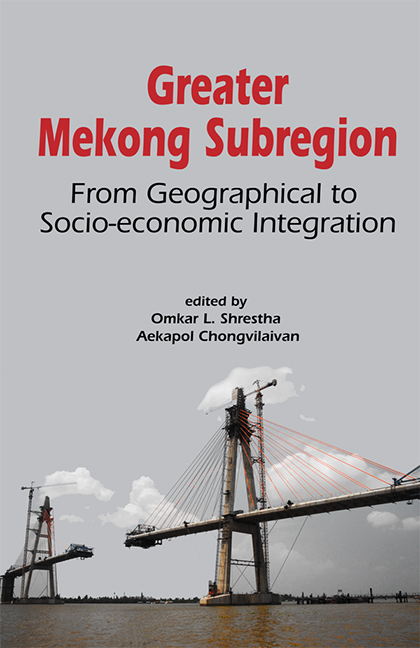Book contents
- Frontmatter
- Contents
- Preface
- List of Abbreviations
- Contributors
- 1 Greater Mekong Subregion: From Geographical Corridors to Socio-economic Corridors
- 2 Cambodia, Its Development, and Integration into the GMS: A Work in Progress
- 3 Subregional Connectivity in the Lao PDR: From Land-locked Disadvantage to Land-linked Advantage
- 4 The Economic Development of Myanmar and the Relevance of the Greater Mekong Subregion
- 5 GMS Challenges for Thailand
- 6 Deepening GMS Cooperation in a More Integrated ASEAN and East Asia
- 7 China (Yunnan)–GMS Economic Cooperation: New Development and New Problems
- 8 Trade and Investment in the Greater Mekong Subregion: Remaining Challenges and the Unfinished Policy Agenda
- 9 Enhancing Financial Cooperation among the GMS Countries
- 10 The Challenges of GMS Regional Integration: Case Study of Governance of the Logistics Industry in Thailand
- 11 Energy Sector Integration for Low-carbon Development in the GMS: Towards a Model of South-South Cooperation
- 12 Linking the Social to the Economic: Broadened Ambitions and Multiple Mitigations in New Mekong Corridors
- Index
4 - The Economic Development of Myanmar and the Relevance of the Greater Mekong Subregion
Published online by Cambridge University Press: 21 October 2015
- Frontmatter
- Contents
- Preface
- List of Abbreviations
- Contributors
- 1 Greater Mekong Subregion: From Geographical Corridors to Socio-economic Corridors
- 2 Cambodia, Its Development, and Integration into the GMS: A Work in Progress
- 3 Subregional Connectivity in the Lao PDR: From Land-locked Disadvantage to Land-linked Advantage
- 4 The Economic Development of Myanmar and the Relevance of the Greater Mekong Subregion
- 5 GMS Challenges for Thailand
- 6 Deepening GMS Cooperation in a More Integrated ASEAN and East Asia
- 7 China (Yunnan)–GMS Economic Cooperation: New Development and New Problems
- 8 Trade and Investment in the Greater Mekong Subregion: Remaining Challenges and the Unfinished Policy Agenda
- 9 Enhancing Financial Cooperation among the GMS Countries
- 10 The Challenges of GMS Regional Integration: Case Study of Governance of the Logistics Industry in Thailand
- 11 Energy Sector Integration for Low-carbon Development in the GMS: Towards a Model of South-South Cooperation
- 12 Linking the Social to the Economic: Broadened Ambitions and Multiple Mitigations in New Mekong Corridors
- Index
Summary
In 1992 the six GMS countries, with the support of the Asian Development Bank (ADB), introduced a programme of subregional economic cooperation (GMS Programme) to enhance their economic relations. Building on their shared histories and cultures, the programme covers nine priority sectors: agriculture, energy, environment, human resource development, investment, telecommunications, tourism, transport infrastructure, and transport and trade facilitation. The programme basically offers member nations positive impulses for diverse development opportunities. Member countries have yet another mutual interest: they all want to use the Mekong River to further their national interests and goals which are not always free of conflict (Schmeier 2010, p. 28). This is where the union can offer opportunities to foster positive cooperation among the states.
In terms of cooperation, the member states of the Greater Mekong Subregion (GMS) reflect a range of very different political situations and economic development levels (Ishida 2005, p. 1). Specifically, issues arise in Cambodia, the Lao PDR, and Myanmar, which are all classified as being among the least developed countries (LDCs). Furthermore, Myanmar illustrates a very authoritarian regime: “There is no regime within South-East Asia that has attracted as much international condemnation for its domestic practices and failures as Myanmar's ruling State Peace and Development Council” (SPDC) (Haacke 2010, p. 153). Naturally this assessment is not viewed positively by the other members of the GMS union of states, nor by the ADB, and, consequently, cooperation is affected. This explains the fact that in this regional association of states, each of the GMS member states has a different level of integration. The economic profile of Myanmar, which is examined in greater detail in this chapter, shows that a stronger integration of Myanmar in the GMS would clearly be conducive to economic growth.
The study of Myanmar's economic development reveals a multitude of problems. When viewed from an economic standpoint, the country is in a desolate state, especially with regard to its economic potential. The causes of this are at times the subject of controversial debate. In recent years, the responsibility for the unsatisfactory economic situation has consistently been placed on sanctions imposed by Western countries (North America and Europe). Cyclone Nargis can also be cited as a cause, as it has had a likewise negative effect on the country's economic situation (v. Hauff 2009, p. 40).
- Type
- Chapter
- Information
- Greater Mekong SubregionFrom Geographical to Socio-economic Integration, pp. 47 - 73Publisher: ISEAS–Yusof Ishak InstitutePrint publication year: 2013



